| A compressed personal reflection |
|
For those wondering if I’m going to follow tradition and kick off my annual round-up with a political rant, this year I’m genuinely not sure I can be arsed. Actually, that’s not true. I had originally decided to save the rant until the end and, but so much appalling crap has gone down this past year that I was ten weighty paragraphs into it before I realised that it was already overshadowing the rest of the piece, and if I carried on like that I was never going to finish and I’d still be venting when summer rolled in. I thus decided to excise what I’d written and briefly summarise a few of the points covered here. Maybe I’ll save the rest for a later angry blog. And I really am furious, as everyone with even half a conscience should be. As I write this, we’re on our third useless (as well as our second unelected) prime minister in less than a year, the party faithful having finally ousted the criminal buffoon, only to replace him with a ditzy shop assistant with a Margaret Thatcher complex whose lack of understanding of basic economic instantly crashed the British economy. She was thus dumped in record time and replaced with an ineffectual sock puppet who has no comprehension of the concept of poverty and whose disastrous attempts at PR are presumably being organised by a bag of wet cabbages. The energy crisis and rampant inflation has resulted in millions of people having to choose between heating and eating, a situation exacerbated by rampant inflation and the highest tax burden on low income families in decades. £37 billion was spaffed on a Covid test and trace system that never really worked and was later revealed to have made no difference whatsoever to the infection and death rate, £4.3 billion was lost to fraud under the furlough scheme that the sock puppet refuses to chase up and reclaim, and a staggering £30 billion hole was punched in the economy by the shop assistant’s cataclysmic mini-budget. Now the sock puppet and his minions claim that there’s no money to pay public sector workers an even close to cost-of-living pay rise. I wonder why. But don’t worry about the economy, don’t worry about spiralling heating bills and rising food prices and the damage done by Brexit, look over there and become incensed at people in small boats fleeing war and persecution, or that person over there doing something ‘woke’. New anti-freedom laws have meant that publicly protesting against the government has effectively been banned, and plans are currently being drawn up to illegalise the only real power that working people have, the right to withdraw their labour. If you support that particular piece of repressive law-making then get ready to kiss goodbye to things like paid holiday, sick leave and maternity leave, and a limit to the number of hours you can be forced to work a day. That's a mere four of the thousands of rights and protections we currently take for granted, many of which were hard won by union action and are set to be disposed of overnight if the Retain EU Bill passes unchanged. I’m sorry, but anyone who still buys into this government’s rhetoric, lies, corruption and attempts to supress our basic rights and freedoms at this point really can fuck right off. Did I mention I’m angry? You don’t know the half of it.
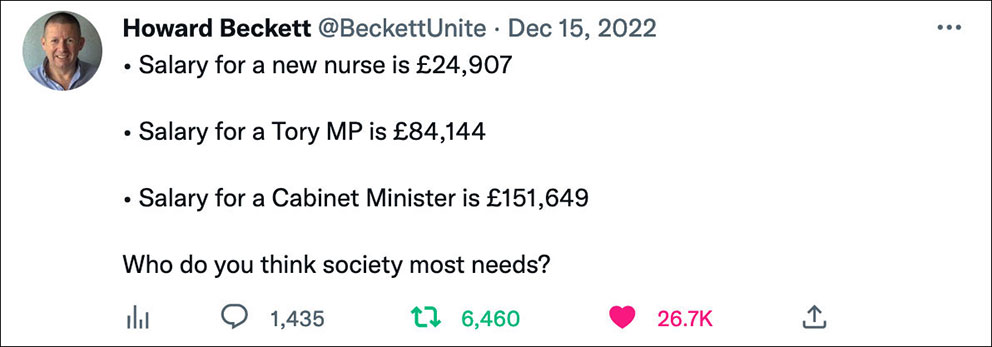
As for me personally, despite the considerable advantages my generation was gifted by chance, financially I’m on increasingly less stable ground these days thanks to those rising energy and food prices and a wage that was frozen for over a decade and now would have to increase by a third to be close to the national median. The thing is, I’m fully aware that reason I’m not in the same dire financial straits as so many others on my income is down in no small part to when I was born (a younger friend pays six times the amount in monthly mortgage payments that I did at his age), and the sort of lucky breaks that those vile individuals who claim poverty is self-inflicted like to falsely claim that they never had. That said, 2023 is the first year since before Covid hit that I will be permitted to accompany my partner to her homeland for a holiday, and if I’m going to pay for that then the heating stays off unless the interior temperature drops into single figures. This is why I tend to stay at work late a lot these days, or at least I did until the heating system there exploded. Ah…
With money tight, it has occurred to me more and more recently that in choosing to commit my free time to film and disc reviewing, I’ve chosen a hobby that at this point in the course I have taken it cannot be used as a source of supplementary income. Indeed, despite having penned over one-and-a-half thousand reviews for the site over a period of 18 years (has it really been that long?), I’ve never made a penny for anything I’ve written, at least beyond the review discs I am sent and permitted to keep (and I'm in now way undervaluing them). I’m also aware that if Cine Outsider was a YouTube review channel, not only would we be reaching a far larger audience than we currently do, we could also be drawing an income from our work, but I’m just too old and too weary to start pissing around with that now. Would I do things differently if I was starting Cine Outsider today? Maybe. But I like the writing process, and not only do I dislike appearing in front of a camera, I also do not have the most engaging vocal delivery – hearing me review a film would be a bit like listening to an incarcerated Renfield from Dracula do so just as his medication was starting to kick in. And who would want to be subjected to that?
As for my health, well it all began rather well, with some savvy advice from the fourth specialist I’ve seen for my peripheral neuropathy enabling me to move from crutches to a rather nifty collapsible walking stick for shorter journeys. The pain is still there, but this was still a big deal. Then, after a 15 month wait, I was finally admitted to hospital for my hernia operation, a day surgery job where a small complication kept me in overnight and made me realise why patients are always so desperate to be let out and got home. The post-op healing process required me to avoid any exercise for eight weeks, which for someone whose only mode of transport is cycling meant two months of revisiting lockdown conditions and working from home. When that ended, I genuinely couldn’t wait to get out, but that’s where things really started to go tits up. On my first day out, I had a broken tooth repaired, one held together with a massive mercury filling from childhood years that my dentist was able to replace after first suspecting the tooth would need to be crowned (the tooth has since cracked under the strain and the temporary crown doesn’t seem to be working, so it looks like the tooth itself will have to go after all). The morning after this I had my Covid booster, and that evening was on my way home when I hit a patch of mud and tumbled off my bike, falling badly and tearing ligaments in my knee and leg, which still hurts like a bastard to this day. A week later I was back at the hospital, where I was told that the mysterious blisters that were forming on my face, around my eye and inside my mouth were down to shingles, which I had developed due to my weakened immune system. Seriously, I have never known pain like it. The doc slapped me on antivirals, but knowing nothing of the condition beforehand, I failed to recognise the symptoms at the crucial early stage. As a result, when the shingles cleared I was gifted with something called postherpetic neuralgia, which is basically the same pain at a reduced but still deeply unpleasant level, but without the unsightly sores. How long this will last is apparently impossibly to predict. For most, it clears within three months, for many it lasts about a year, and for the select few it haunts them for the rest of their days. I’ve long passed the three month mark now and it’s still unpleasantly active, but I am dosed up on anti-anxiety pills that are surprisingly effective at reducing the pain, but replace it the most unpleasant conviction that a family of spiders is crawling across my face. Not the most comforting sensation for a lifelong arachnophobe.
I’m still not sure whether it’s the above detailed malaises, or the tablets they slapped me on, the age-related long-term muscle pains that disrupt my sleep, or even a combination of all four that are making me so bloody tired these days. It’s this that has slowed up my review writing, as by mid-evening I’m often dozing where I sit, which also cut the number of films I planned to cover at the London Film Festival by more than half. The site continues to tick over, thanks in no small part to the efforts of Gary Couzens, who despite his own challenges has reviewed almost every BFI disc released in the UK this year, and although most of free time is currently being swallowed up with paid work, Camus is still keeping his hand in with film reviews when he is able. My medically induced tiredness has resulted in me missing many reviews that I fully intended to write, discs that were sent to us and were popped on the to-do pile but that I ultimately could not make the required time to cover. This is particularly true of the last two weeks of 2022, as when my holiday break from work began I quickly realised just how much I needed an extended break from sitting in front of a computer screen, an activity that also dominates my every working day. It took me until the tail end of this break period to get up the necessary steam to even start writing this, but I did use the down time to catch up on some of the films that I missed that hit UK cinemas during the past year, a couple of which have made their way onto the list below.
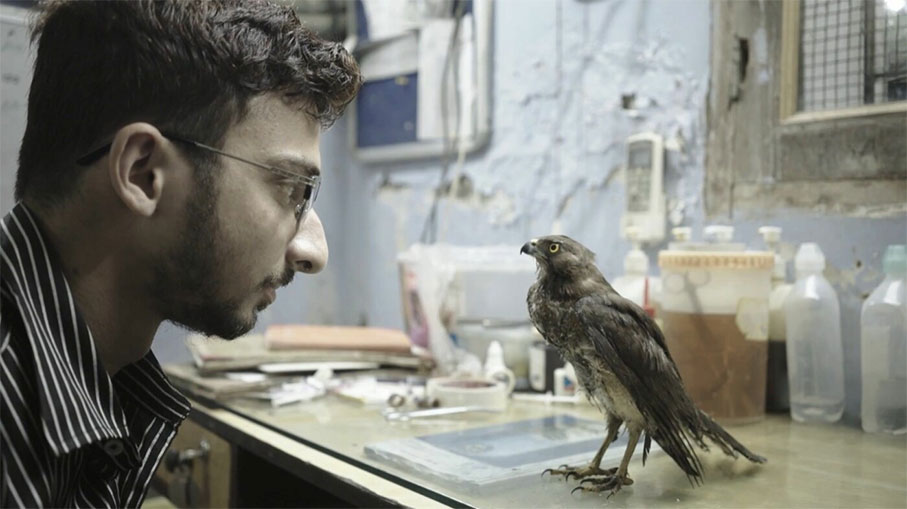
As someone who loves seeing films on a big screen but these days prefers the complete isolation of his home cinema system – where there is nobody talking or checking their bloody phone or commenting on the action within ear or eyeshot – there are many films I desperately wanted to see but that I’ve not been able to track down yet or wedge into my schedule. This is particularly frustrating, as I have a strong suspicion that some of them would have ended up on my list. Notable highlights include Charlotte Wells’ critically lauded Aftersun, Shaunak Sen’s All That Breathes, Santiago Mitre’s Argentina 1985, Park Chan-wook’s Decision to Leave [Heojil kyolshim], Paul Thomas Anderson’s Licorice Pizza, Apichatpong Weerasethakul’s Memoria, Brett Morgen’s Moonage Daydream, Todd Field’s Tár, Joachim Trier’s the Worst Person in the World [Verdens verste menneske], and Goran Stolevski’s You Won’t Be Alone. I realise there are some real heavy-hitters in there that are dominating other personal picks of 2022, but such are the breaks of being an antisocial isolationist with limited free time.
As ever, the choices below are all completely personal to me and were chosen because I found them particularly rewarding and/or enjoyable – in the illness-ravaged final third of the year, they brought me comfort when I had little energy to do anything else but stare appreciatively at the screen. I originally intended to note down all the films that I watched this year and perhaps include some of the ones from previous years that I finally caught up with, but like so much in the past 12 months, that plan quickly fell by the wayside. I’ve thus doubtless forgotten a few films that I saw earlier in the year that I will later be kicking myself for not including. As site regulars will know, I don’t do preference-order countdowns or stick to round numbers, so below are 14 alphabetically listed films that I particularly enjoyed and/or was impressed by that I saw for the first time in 2022. Most came out here in 2022, but as in previous years I’ve cheated on two that I saw at the London Film Festival and have yet to get a UK release, which I sincerely hope they receive in the coming months. I’ll avoid detailed plot descriptions here – where the films have been more fully reviewed on the site, there will be a link that you can follow to see the film, its story and its specific merits covered in more detail.
In past years my film list has also included a couple of streamed series, but this time I’ve decided to make it a movie-only affair, but still want to give three Netflix series that I enjoyed a quick shout first. Thus, before we get to the movies…
This year the final series of Better Call Saul hit the platform, a spin-off from the mighty Breaking Bad that not only had no right to be as good as it initially was, but that ultimately proved the equal of its forebear, particularly in the exceptional quality of its performances, its superb shot composition and its immaculate editing. It brought the series to an unexpected but oddly satisfying conclusion, and for those who, like me, were watching each episode as it was made available, it delivered the most nail-chewing cliff-hanger at the end of episode 7, then was put on pause for six agonising weeks for the sort of summer recess that American series sometimes like to torture their viewers with. I’m really going to miss this one.
Guillermo Del Toro’s Cabinet of Curiosities features eight horror tales either based on short stories written or co-written by Del Toro, or screenplays in which he had a hand. The influence of the writings of H.P. Lovecraft is all over some of the tales, and the budgets for each episode were clearly substantial, ensuring that they never look less than stellar. The project also attracted some serious talent, with stories directed by Del Toro’s former regular cinematographer Guillermo Navarro, Vincenzo Natali (Cube, Splice), David Prior (The Empty Man), Ana Lily Amirpour (A Girl Walks Home Alone at Night), Keith Thomas (The Vigil), Catherine Hardwicke (The Lords of Dogtown) and Panos Cosmatos (Mandy). For me, the best of all was the final tale, The Murmuring, which was directed by Jennifer Kent (The Babadook, The Nightingale) and starred Essie Davis and Andrew Lincoln, and had an emotional kick not present in the preceding stories, enjoyable as hell though many of them are.
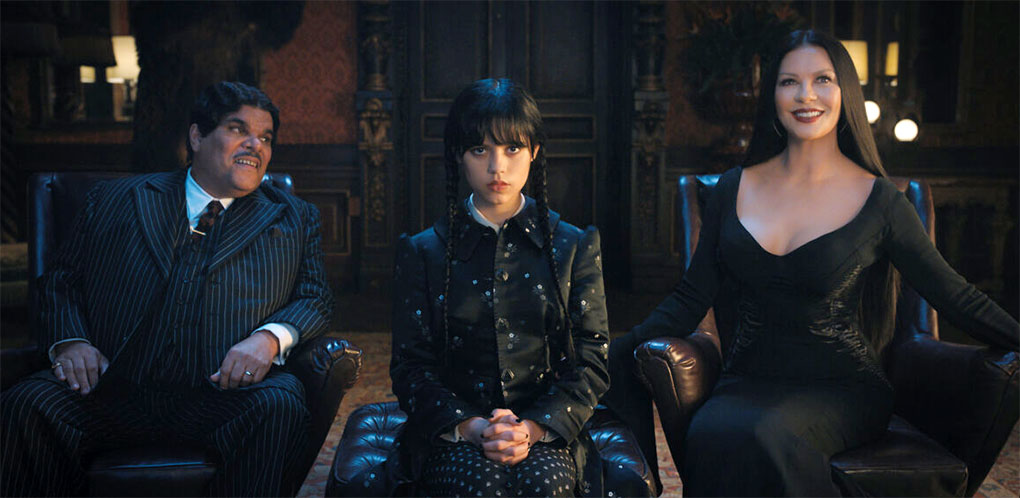
Finally, I have to give a shout for Wednesday, Tim Burton’s reimagining of The Addams Family from the viewpoint of young Wednesday Addams as she is forced to enrol in the Nevermore Academy, where she becomes obsessed with uncovering the mystery of a monster that prowling the local woodland and killing locals. And it’s so much fun. Burton himself sets the style in his distinctive direction of the first four episodes (which were also scored or co-scored by long-time collaborator Danny Elfman), and it’s no surprise that it looks consistently gorgeous, thanks to Mark Scruton’s gothic production design and David Lanzenberg and Stephan Pehrsson’s handsome cinematography. But what really sells it is a genuinely superb cast. It was apparently Burton himself who insisted that Gomez Addams be closer to the original Charles Addams illustrations than previous suave and good-looking film and TV interpretations, hence the casting of Luis Guzmán in a role previously played by the likes of John Astin and Raul Julia, and he makes for delightfully odd pairing with Catherine Zeta-Jones’s tall and elegant Morticia. Christina Ricci, whose film career was launched by her performance as Wednesday in Barry Sonnenfeld’s The Addams Family (1991) and Addams Family Values (1993), is almost unrecognisable as eager housemistress Marilyn Thornhill, and every staff member and student and townie has been cast with meticulous care. But knocking out of the park is Jenna Ortega (who also appeared this year in T West’s X) as Wednesday Addams, creating a sullenly antisocial character who is so cool, so deadpan funny and so fearless that were I still in my early teens (Orgeta was 19 when she played the role, I should note), I have a feeling I’d have been in love with her and had her picture on my bedroom wall. She is, however, given a run for her money at times by Emma Myers as her impossibly chirpy and excitable roommate Enid Sinclair, whose every comically bouncy appearance I quickly came to treasure.
ALL QUIET ON THE WESTERN FRONT
The first German language adaptation of Erich Maria Remarque’s celebrated anti-war novel is unsurprisingly and most appropriately gritty and impactful, and although Lewis Milestone’s superb 1930 adaptation still casts an imposing shadow, this new interpretation, directed by Eric Berger and written by Berger in collaboration with Ian Stokell and Lesley Paterson, still makes a hell of an impression. At a time when we are witnessing the devastating human impact of Vladimir Putin’s wretched ego-driven invasion of Ukraine, it’s a timely reminder of the terrible toll that war takes on the young men tasked with actually fighting it, and how disconnected from the carnage those who demand that they do so remain. This one grabbed me from the opening scenes, where the notion of recruits as disposable fodder that would be outlived by their recycled uniforms is ominously brought home, and not since Paths of Glory have I been more glad to have never experienced the horrors of trench warfare.
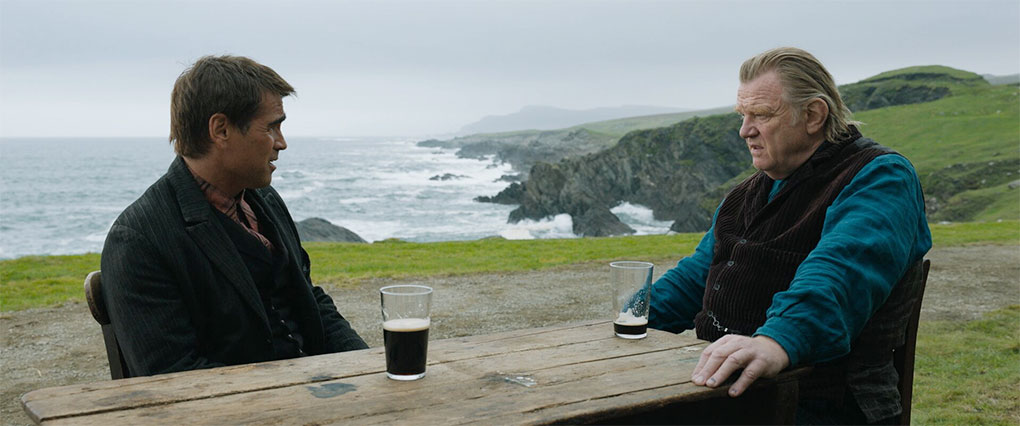
THE BANSHEES OF INISHERIN
As a screenwriter and filmmaker, respected playwright Martin McDonagh has already proved his worth with his glorious debut In Bruges, the underrated Seven Psychopaths, and the multi-award winning Three Billboards Outside Ebbing, Missouri. Expectations were thus unsurprisingly high for his latest, the intriguingly titled The Banshees of Inisherin, particularly as it reunited In Bruges stars Colin Farrell and Brendan Gleeson, and as far as I’m concerned, those expectations were not just met but exceeded. In a sense, this is a flipside of the developing bromance of the earlier film, focussing instead on the breakup of a long-term friendship between small Irish island residents Pádraic (Farrell) and the older Colm (Gleeson) and the emotional impact this has on both of them. Triggered by Colm’s claim that he just doesn’t like his former friend any more, the resulting fallout becomes a metaphor for failed relationships in general and the destructive foolishness of conflict on a wider scale, symbolised here by the civil war still playing out on the mainland, the sound of which at one point prompts Pádraic to wonder, “whatever they’re fighting about.” There’s an irony in the fact that the saddest film I saw all year is also one of the funniest, and as someone for whom death is no longer an abstract concept, I found myself sympathising almost as much with Colm’s existential crisis as I did with Pádraic’s bemused refusal to accept that the friendship around his life has been built could suddenly be over. Beautifully performed by Farrell and Gleeson, with superb support from Kerry Condon as Pádraic’s more pragmatic sister Siobhán and Barry Keoghan as abused policeman’s son Dominic Kearney, it’s a gorgeously shot and directed work, and may well be McDonagh’s finest film to date.
Film review>>
BOILING POINT
Have you ever worked in a restaurant kitchen when things aren’t going well and the boss and half the staff are stressed out? I have, and rarely have I seen the true essence of that situation captured on film (well, HD) more acutely than in Philip Barantini’s appropriately titled Boiling Point. The ever-impressive Stephen Graham plays Andy Jones, the owner of a small but reputable London restaurant whose previous 5-star rating has just been downgraded following a critical health and safety inspection, and over the course of the evening sitting has to deal with a range of staff and customer issues. Shot in a single, almost invisibly continuous and perfectly choreographed 90-minute take that perfectly captures Andy’s mounting frustration and panic, it’s a rivetingly handled and sublimely acted drama, and one that received the Second Sight Limited edition special treatment on Blu-ray in November. I really must get that!
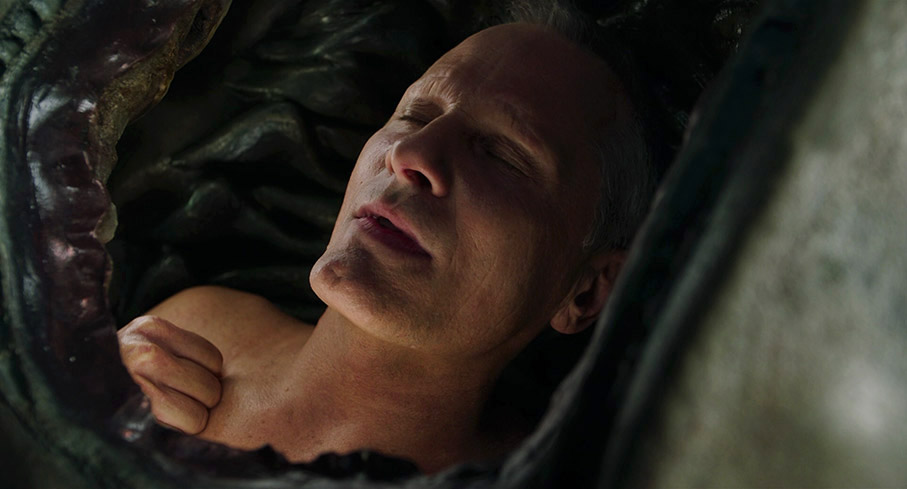
CRIMES OF THE FUTURE
David Cronenberg’s first feature film since 2014’s Maps to the Stars was met with disappointment in some quarters, and on a first viewing I was willing to concede that it felt more like a summation of the director’s filmmaking career than an original work, but subsequent viewings have convinced me that it’s so much more than that. Working both as a celebration and a critique of artistic vision and the abstract notion of ‘purity’ in art, it also explores the how biological, chemical and technological advancements could affect the human evolutionary process, as well as touching on subjects as diverse as the toxic nature of celebrity culture and the damaging effects of microplastics to the food chain. It’s a compellingly realised vision of an alternative future where analogue video technology sits side-by-side with biomechanical advances in surgery that have been driven not by the need for medical advancement, but a perceived desire to push the extremes in art and entertainment.
Film review>>
CROWS ARE WHITE
My favourite of the documentary features I saw at this year’s London Film Festival (in part, perhaps, because I didn’t see Shaunak Sen’s All That Breathes, which won the festival’s Best Documentary award), Ahsen Nadeem’s intriguingly titled Crows Are White had the initial hook for this Japanophile of being about a reclusive Buddhist monastery located at the top of Mount Hiei in Kyōtō. Yet from the director’s opening narration I quickly realised that this was to be no straight documentary portrait, and what unfolds becomes a very personal journey for the filmmaker, one littered with unexpected twists, huge setbacks, fascinating characters and surprising revelations. In the hope that the film lands a UK release of some form in 2023, I’ll avoid revealing too much about it here (if you want more detail, check out the link below), but if you do get the chance to see this remarkable work, I’d encourage you to take it – the chances are it will surprise, delight and sadden you, but ultimately fill you with a sense of serene joy.
London Film Festival review>>
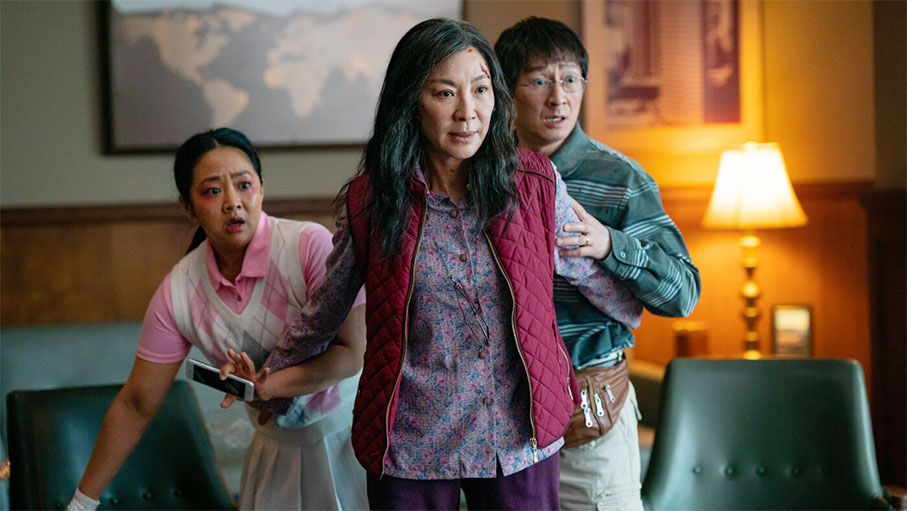
EVERYTHING EVERYWHERE ALL AT ONCE
What a film to watch for the first time without knowing much about it beyond its hook of a title and some very positive early buzz. This socially conscious, emotionally grounded multiverse tale from writer-directors Daniel Kwan and Daniel Scheinert – aka The Daniels – is a mini-masterpiece of complex storytelling, one that bounces us through a mind-bending number of alternative universes at sometimes dizzying speed, but miraculously never becomes confusing in the process. How was it, I wondered after my first joyous viewing, that despite the constantly shifting reality I always knew where I was and what was going on? That, dear people, is great writing and direction. A glorious cast led by the ever-wonderful Michelle Yeoh has a ball with its characters, notably Jamie Lee Curtis playing against her younger body-perfect screen image as a grumpy and pot-bellied Internal Revenue inspector. As has been noted elsewhere, the film also expertly sums up what it feels like to live in the Covid-disrupted, social media driven, post-truth modern age, where we are bombarded with ideas and imagery on a daily basis and have to pick our way through to make sense of our lives and the world we now live in.
Film review>>
THE GLASS ONION: A KNIVES OUT MYSTERY
Rian Johnson’s 2019 Knives Out was a film that for me came out of nowhere and was a small miracle of film entertainment, sending up the conventions of the murder mystery genre whilst never mocking them, and functioning as a wonderfully twisty whodunnit in its own right. It also introduced us to a glorious new screen creation in Daniel Craig’s southern-accented detective Benoit Blanc, and despite my inbuilt nervousness when it comes to sequels to respected hits, I have to admit to being just a little bit excited for a second adventure for this doggedly determined and oddly likeable sleuth, particularly as Johnson was once again its writer-director. And while it inevitably lacked the wow-surprise factor of the original, the decision to drastically switch locations, a perfectly timed mid-film rewind and rethink of the plot, and another riotously engaging set of characters and performances made it the most fun my partner and I had watching a new film together all year. It also pissed off whiney right-wing dweebs like Ben Shapiro for suggesting that some billionaires might just be dumber than they like to make out, which alone should be a good enough reason to stick it on this list.
GUILLERMO DEL TORO’S PINOCCHIO
Despite having the greatest of respect and admiration for the filmmaker whose name heads up this title, it took me a while to drop my guard and give this one a look. I’ve never been particularly enthralled by this story, and what I saw of the recent Disney live action adaptation was enough to put me off it for life. But word of mouth on this one was seductive, and a prompt from my partner saw us give it a try, and it’s safe to say that we were both bowled over. Co-directed by Del Toro and Mark Gustafson, the action here is transposed to 1930s Italy under the rule of Benito Mussolini’s National Fascist Party, which thematically aligns the film to Del Toro’s earlier live action fantasies, The Devil’s Backbone and Pan’s Labyrinth and brings a dark socio-political edged to a work that really does feel constructed with an adult audience in mind. Gorgeous design, beautiful stop-motion animation, some fine voice work from the likes of Gregory Mann, Ewan McGregor, David Bradley, Ron Perlman and John Turturro (with the monkey Spazzatura’s squeaks and grunts voiced by Cate Blanchett), and a fine score by Alexandre Desplat all come together sublimely in a thoughtful and unexpectedly moving revisionist take on this famous tale.
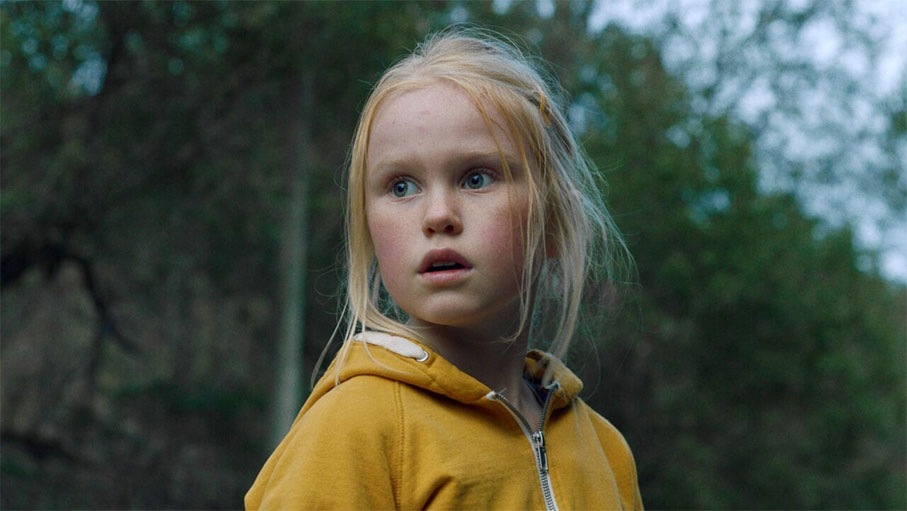
THE INNOCENTS [DE USKYLDIGE]
Young Ida and her non-verbally autistic sister Anna move with their parents to a forest-surrounded Norwegian housing estate. Ida hooks up with the similarly aged Ben, who demonstrates to her an ability to move small objects with his mind, while Anna is befriended by Aisha, who appears to be able to communicate with her on a telepathic level. A mental bond soon develops between Ben, Aisha and Anna, but as Ben’s powers in particular grow in strength, what begins with simple games starts to and altogether more sinister turn. Right from the opening scenes, writer-director Eskil Vogt creates the sense of a community detached from the outside world, one where powers are developed by children who do not yet have an understanding of morality or the potential consequences of their actions. It’s a slow-burn tale, beautifully told, with a strong focus on atmosphere and excellent performances from the four child actors, and there are sequences here that are amongst the tensest that I watched all year, as well as a few moment where I let out a startled yelp. The best horror film told from a child’s viewpoint that I’ve watched since Tomas Alfredson’s 2008 Let the Right One In, but if you’re a cat lover, be ready to hide behind your hands a couple of times during the first half-hour.
NOPE
I was as surprised as anyone when comedian Jordan Peele turned in one of the smartest and most satisfying horror movies of 2017 with Get Out, and immediately the pressure was on to see what he would deliver by way of a follow-up. The 2019 Us didn’t please everyone, but for me this doppelganger home invasion horror, with its potent layers of subtext, was every bit as smart and entertaining, and this developing trend is continued with his latest, Nope. Ostensibly a horror-tinged science fiction tale of a brother and sister whose ranch seems to be ground zero for a series of strange and possibly extra-terrestrial events, it once again rewards as much in its complex subtextual layering as it does with the slick execution of its compelling surface story. Get Out’s Daniel Kaluuya once again impresses as quietly spoken horse trainer’s son OJ, as does the Keke Palmer as his energised motormouth polar opposite of a sister, Em. An eerie otherworldly mystery that grows in scope and scale to a visually spectacular finale, it shows Peele the filmmaker spreading his directorial wings in a way that does not dilute the film’s core themes.
Film review>>
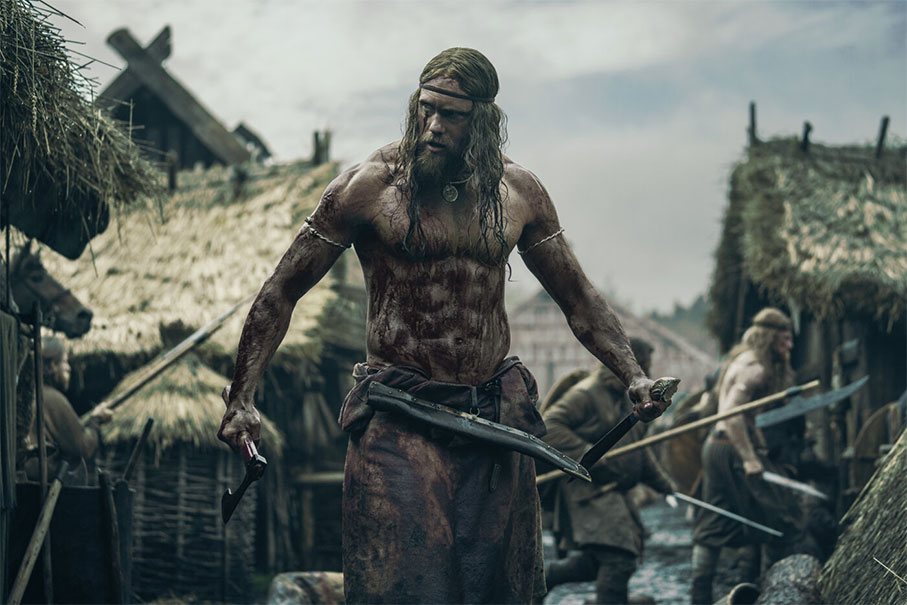
THE NORTHMAN
Another film I was initially apprehensive about seeing for reasons that retrospectively seem a little daft but do at least have some historical precedence. Having watched Robert Eggers establish himself as one of the most visionary directors working today with the utterly chilling small-scale horror gem The Witch and the extraordinary two-hander that was The Lighthouse, the idea of him taking on a large scale Viking drama and a budget of something like seven times that of The Lighthouse made me just a little nervous. How many times have we watched talented indie filmmakers fall on their face when a studio hands them a Hollywood sized project? What didn’t help were the stories that started emerging of changes being insisted on by studio execs following negative feedback on some elements at test screenings, and Eggers has since said that the editing process was the most difficult of his career. Eventually I put my apprehension aside and watched the film, and quickly realised I should have had more faith. Eggers’ almost obsessive attention to detail, fascination with folklore, commitment to historical accuracy and sheer skill as a filmmaker had me hooked from the opening scene and held me in an iron grip for the entire 136 minute runtime. A brutal, darkly masculine and haunting work, it looks amazing, thanks to Craig Lathrop’s production design, Linda Muir’s costumes, and The Lighthouse’s Jarin Blaschke’s atmospheric scope cinematography, in which daylight or practical elements (fires or torches) are always the principal light source. The actors completely commit to their roles, with standout work from Alexander Skarsgård as vengeful Viking warrior prince Amleth and Anya Taylor-Joy as Slavic sorceress Olga of the Birch Forest, and I’ve not seen another film all year that so immersed me in the authenticity of the world that it creates. I’m normally allergic to remakes of classic movies, but I genuinely can’t wait to see what Eggers does with Nosferatu.
RRR
Glass Onion may be the most fun I had all year watching a film with my partner, but even that paled in comparison to the absolute ball I had with S.S. Rajamouli’s epic blast of an action-drama. A fictionalisation that teams two historical figures (who in real life never actually met) and transforms them into Indian superheroes, it’s set in 1920 during the British Raj and presents the British as the most inherently evil of bad guys with the sort of binary gusto usually reserved for the occupying Japanese in 70s kung fu movies. Three madly entertaining hours long, it throws everything in the book at the audience, then the book, the press it was printed on and anything else Rajamouli can lay his hands on. The action scenes are insane, the fight choreography is amazing, and the normal rules of human biology and physics just do not apply here. Indeed, this is a world where anything from lethal snake venom to a broken leg can be quickly fixed with the right plants and a little prayer, where our heroes can fend off an armed soldiers by throwing a live tiger at them or swinging a motorcycle like a baseball bat, and where prejudice is confronted and humiliated with furious dance and a single heartfelt song can inspire revolution. It’s as bonkers a film as you’ll see all year, but also one of the most thrilling, emotionally affecting, hilarious and fabulously made. Its stellar reputation is well deserved.
THE WOMAN IN THE WHITE CAR
Of the few films I did manage to catch at this year’s London Film Festival, this first feature from South Korean director Christine Ko just edges out Crows Are White as my favourite. When two sisters arrive at a small town hospital, one seriously injured and the other in an uncommunicative state of shock, diminutive policewoman Kim Hyun-ju and her younger partner are charged with investigating what has happened to them. And that’s ideally all you should know before going into the seductively low key and twisty tale, where seemingly established fact is repeatedly undermined as new information is uncovered, and the true reasons for Kim’s determination to get to the bottom of this case start to become clear. It’s a riveting watch that I just cannot believe has yet to find a distributor just about anywhere. Release this movie!
London Film Festival review >>
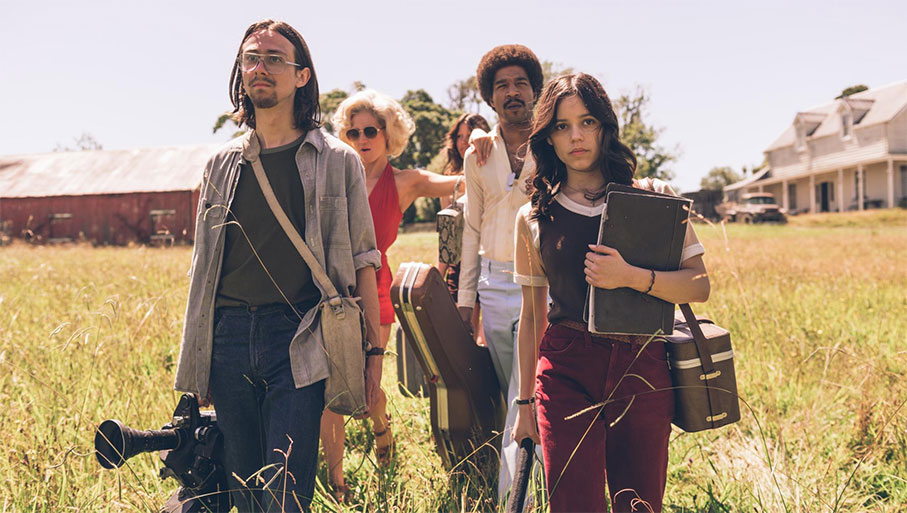
X
Director Ti West really put his name on the horror map in 2009 with his third feature, The House of the Devil, a film that beautifully recreated the look and feel of the best genre works of the 70s and 80s, and compelled through its characters and atmosphere rather than jump scare shocks and gore. That said, when it startled, it really did so. His 2011 The Innkeepers was another nicely handled tale of mounting dread, and his 2013 The Sacrament was an expertly handled slow-burn cult-camp tale that drew strong inspiration from the Jonestown massacre. Since then, he’s largely been working in TV, but he returned to his horror roots this year with the low budget X, which is not only set in 1979, but also visually recreates the look and feel of genre classics from that era, with specific stylistic nods to the setting and cinematography of The Texas Chain Saw Massacre. The story of a small group of young porno filmmakers who have hired a farmhouse in which to shoot their latest production without revealing to the property owners the details of their project is winningly performed by the entire cast, particularly Mia Goth in a dual role as aspiring porn starlet Maxine Minx and ageing farmhouse owner’s wife Pearl. This really showed West back in the directorial saddle and was a particular treat for those of us old enough to have experienced the films from which it draws inspiration on their first run, the conventions of which it plays some interesting games with. Frustratingly, the simultaneously filmed origin story, Pearl – which horror fans across the water have championed as equal to or even superior to X – does not arrive in the UK until March 2023.
I’ll kick off by admitting that there were once again so many great discs released this year that I only found the time and money to see a small fraction of them, and even some of those sent to us for coverage have sadly gone unwatched and unreviewed. Promising to do better in 2023 rings hollow when you’re being slapped around the face, legs and torso by age and medical issues and the government has pushed the NHS to breaking point. But I will try. Honest, guv.
As with the above film list, the discs I’ve highlighted below are personal picks from the titles I have managed to see and in many cases review. Quality plays its part, but there are inclusions here that are on the list in part because of that “Wow! That film has come to Blu-ray at last!” factor that still has me excited for every new release announcement. As ever, I have to salute the work of labels like Indicator, Eureka, Arrow, Second Run, Second Sight and the BFI, and suspect I may be saying similar this time next year for new label Radiance Films, whose feature-packed release line-up for early 2023 is certainly intriguing.
Again, the chosen titles are listed alphabetically and not in any order of preference, and try as I might I couldn’t get the picks down below 20 titles, all of which I’m overjoyed to have in my collection. Obvious omissions here include Arrow’s ShawScope Volume 2 and Eureka’s 4K UHD release of the Police Story Trilogy, neither of which I can afford to buy just yet. I also would have included Criterion’s Blu-ray release of David Lynch’s superb Lost Highway had the 4K UHD version released in the US also been made available in the UK, but it wasn’t, dammit. And yes, this is the year that 4K releases are giving Blu-ray titles a run for their money on my list.
I should note that one disc that was on this list but ended up dropped from the top slot was the Second Sight UHD release of Neil Marshall’s superb werewolf movie Dog Soldiers. Don’t get me wrong, the transfer is terrific and the special features and packaging are excellent, but it was missing my absolutely favourite extra from the DVD, a cast and crew commentary that may be the funniest I have ever heard. I’m guessing this was down to a rights issue, but it prevents the UHD from being the definitive edition I was hoping for, and means I’ll have to hang on to that DVD.
And so, to the list.
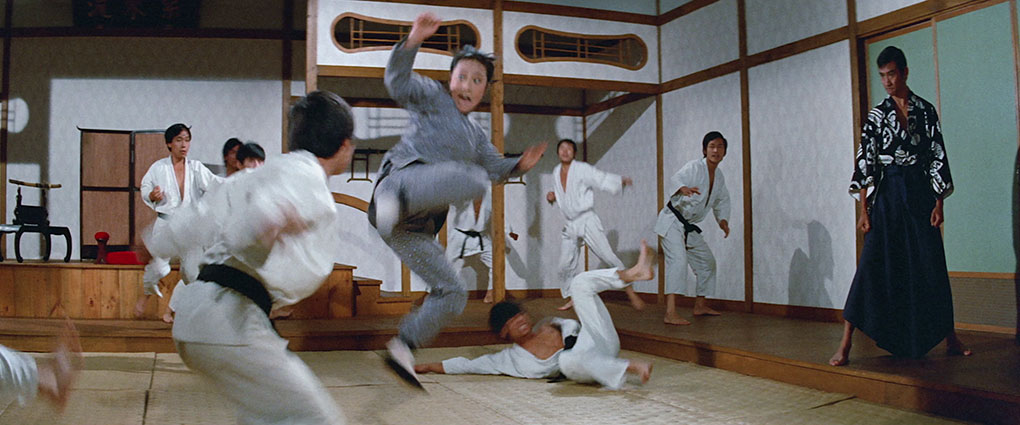
ANGELA MAO: HAPKIDO AND LADY WHIRLWIND (Eureka Blu-ray)
Two of my favourite movies from the first golden era of Hong Kong kung fu cinema, both featuring the wonderful Angela Mao, just about the only female genre star I got to see in my underage cinemagoing youth and one whose strength of character and ferocious martial arts skills had the teenage me besotted. Amazingly, aside from their anti-Japanese sentiment – a common feature of Hong Kong martial arts films of the day – both films still hold up as thrilling demonstrations of the skills of their performers, and they both look terrific in these new 2K restorations. A total of five commentaries and a slew of other new and archive material in the special features make this an absolute must-have release for fans of old-school martial arts cinema.
Blu-ray review>>
THE CAT AND THE CANARY & THE GHOST BREAKERS (Eureka Blu-ray)
At the risk of repeating myself, this is another double-bill of films that shaped my childhood, the first of which was probably instrumental in hooking me on the horror genre as a whole. A top-of-form Bob Hope cracks the jokes whilst navigating some genuinely spooky situations with perfectly matched co-star Paulette Godard, and while I hold the second film in high regard, for me The Cat and the Canary is as pitch-perfect a horror comedy as you could ask for. Enthusiastic commentaries for both films are supplemented by an informative interview with Kim Newman, and a fascinating radio adaptation of The Ghost Breakers.
Blu-ray review>>
COACH TO VIENNA (Second Run Blu-ray)
One of my favourite Second Run releases of the year and another film I would likely not have seen were it not for the valiant work of this excellent label. Late in WWII, just hours after her husband has been murdered by the Nazis, middle-aged Czech woman Krista is forced by a young and disillusioned Austrian soldier named Hans to transport him and his seriously injured companion Günther to the border. It’s a simple setup that director Karel Kachyňa works small miracles with, kicking against the approved norm of the day by presenting the Hans in a sympathetic light and then wringing tension from Krista’s desire for murderous revenge and what might happen if Hans or Günther realise what she is planning. It’s a superb work, handsomely presented from a new 4K restoration, with an excellent commentary track by Samm Deighan, Kat Ellinger and Mike White, director Kachyňa’s fascinating film school graduation feature, and an insightful booklet essay by Jonathan Owen.
Blu-ray review >>
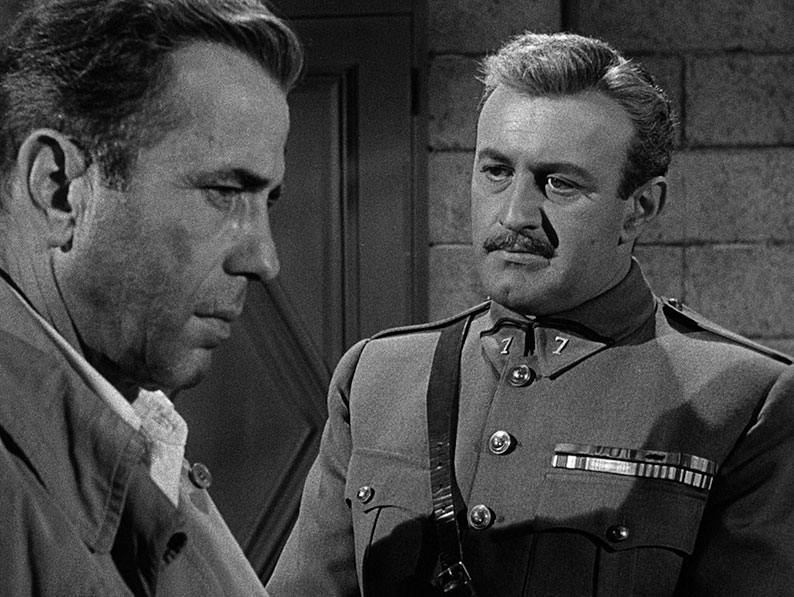
COLUMBIA NOIR #5: HUMPHREY BOGART (Indicator Blu-ray)
Perhaps the most inevitable inclusion on this list, considering that all of Indicator’s previous Columbia Noir sets have also made the annual cut, but considering how great these box sets are, how could I not include one devoted to one of my favourite classic era Hollywood stars? Six Bogart films, all handsomely restored, each with a commentary track and a generous collection of special features, making this another must-have for noir – and indeed Bogart – afficionados.
Blu-ray review>>
DRIVE (Second Sight 4K UHD)
Nicolas Winding Refn’s delicious 2011 neo-noir was given a serious Second Sight makeover for a gorgeous Limited Edition 4K UHD release, one whose box is so beefy that it occupies the same space on my shelf as five regular Blu-ray discs. When you open it up you soon see why, as it not only includes the film on UHD and Blu-ray, but a 240-page hardback book packed with essays and interviews, and a copy of the original novel by James Sallis. The Dolby Vision HDR does make it clear that the film was shot on HD, but this is one time where that aesthetic feels right for the story being told. It also has an absolute belter of a Dolby Atmos soundtrack, throwing the music that is such a crucial aspect of the film around the room at the volume and clarity of a nightclub sound system.
GET CARTER (BFI 4K UHD)
The BFI continued to surprise in its choice of UHD releases with one of the greatest and most enduring British gangster movies, Mike Hodges’ still superb Get Carter. This is a dream release for fans of the film, presenting the film in 4K and HDR and really packing in the special features, including two commentaries, Mike Hodges in conversation at the BFI, interviews, featurettes, a short film about The Ship Hotel on Teesside, and more. The package also include a double-sided poster, postcards, and an 80-page book with new essays, notes on the restoration, and a transcript of Alex Cox’s introduction to the film’s 1990 Moviedrome screening. Marvellous.
Blu-ray review >>
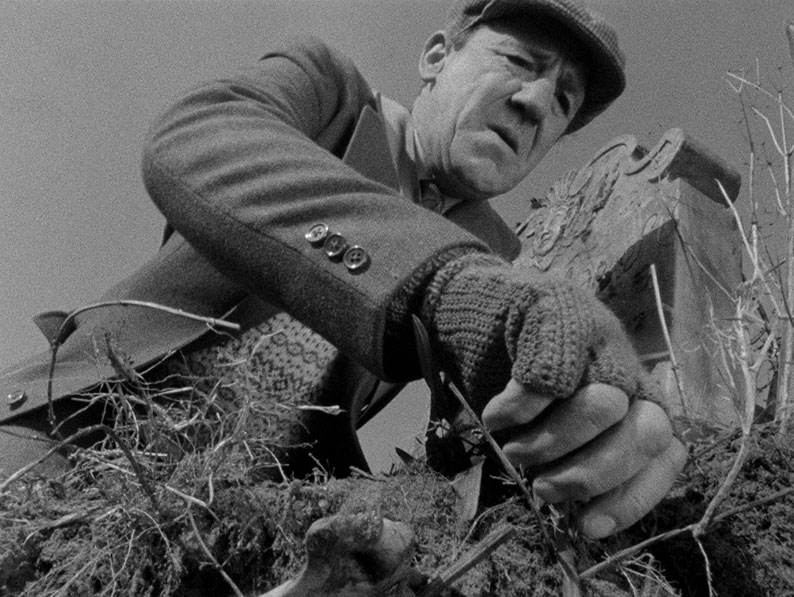
GHOST STORIES FOR CHRISTMAS, VOLUME ONE (BFI Blu-ray)
This one really caught me out. Some years ago the BFI released a series of DVDs featuring titles from the BBC’s annual Ghost Stories for Christmas, all of which I own and most of which I covered for the site. It almost slipped my mind that these annual spooky treats were all shot on 16mm film, and thus would be ideal candidates for HD remastering, despite the fact that many were shot on what looks like high-speed, high-grain stock. And they really look good here, none more so than Jonathan Miller’s superb Whistle and I’ll Come to You, the first of the four M.R. James adaptations that comprise this first volume. Not content with just remastering the image and sound, those responsible for this fine release also commissioned new commentaries and ported over all of the special features from the previous DVDs. This was a particularly popular one in my household – I bought this release and Arrow’s Yokai Monsters Collection Blu-ray set for my delighted horror-loving partner for Christmas.
Blu-ray review>>
JUN-ON: THE GRUDGE COLLECTION (Arrow 4K UHD/Blu-ray)
And by an alphabetic coincidence, we now get to a Christmas present that my partner bought for me, a splendid four-disc set from Arrow Video that contains not just Shimizu Takashi’s first two Ju-On films, but their two straight-to-video precursors – which have never before been released on home video outside of Japan – and the White Ghost/Black Ghost diptych set in the same universe. Best of all, Ju-On: The Grudge has been remastered and restored in 4K from the original camera negative by Arrow Films and is presented here on 4K UHD and looks really good, particularly the richness given to the image by the Dolby Vision HDR. The films are supported by a plethora or special features, including commentaries, introductions by the director, interviews, behind-the-scenes footage, and more, plus a 60-page booklet, a double-sided poster, and postcards.
KARLOFF IN MANIACAL MAYHEM (Eureka Blu-ray)
I really am loving these three-film collections of Boris Karloff titles from Eureka, and this one was an absolute treat. The third volume in what I hope is an ongoing series (it was preceded by Karloff at Columbia and Universal Terror) features handsomely restored transfers of three of the actor’s finest lesser-known genre films from three different decades in The Invisible Ray (1936), Black Friday (1940) and The Strange Door (1951). Adding to the fun are excellent commentaries on all of the films from the usual horror suspects, and three radio adaptations of The Sire de Maletroit’s Door, the Robert Louis Stevenson story from which The Strange Door was adapted.
Blu-ray review>>
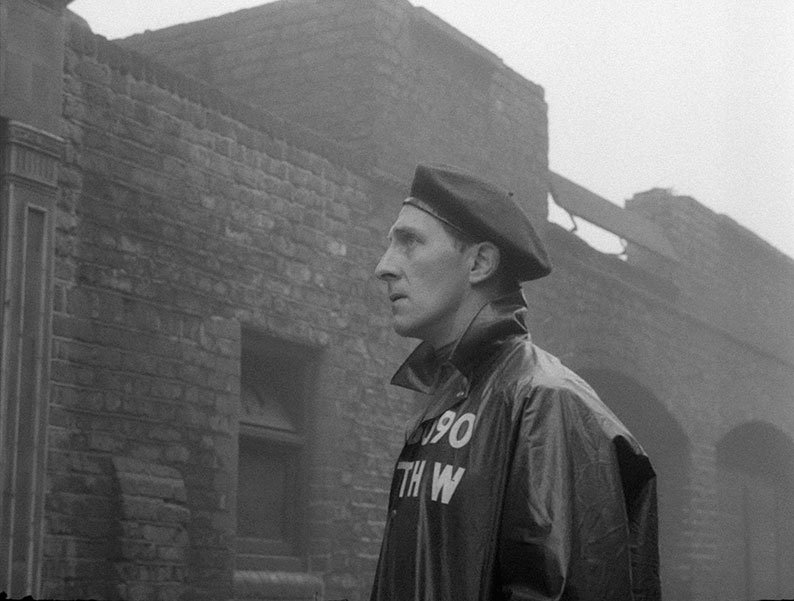
NINETEEN EIGHTY-FOUR (BFI Blu-ray)
Quite possibly the best and most faithful adaptation of George Orwell’s dystopian classic was written for the BBC in 1954 by Nigel Kneale and starred Peter Cushing as Winston Smith, Yvonne Mitchell as Julia, André Morell as O'Brien, and Donald Pleasance as Syme. Orwell’s estate apparently nobbled two previous attempts to release the film on disc, but when the copyright expired in Britain and Europe in 2021, the way was finally open for the BFI to prepare and release this impressive Dual Format edition. Restored in 2K from 35mm telerecordings and 35mm negative of the pre-filmed material, this is likely as good as the film is every going to look given when it was made, and the transfer is supported by some excellent supplementary material, including a commentary by Jon Dear, Toby Hadoke and Andy Murray, a discussion on the work of celebrated television screenwriter Nigel Kneale, and more. I’ve waited years for this release, not knowing if it would ever happen, and am so glad it finally did and was as good as it proved to be.
Blu-ray review>>
ONE FOR THE ROAD (Indicator Blu-ray)
A film for which I have a particular affection landed one of the most comprehensive – I’m tempted to say definitive – Blu-ray releases of 2023. It’s a film we screened at the cinema-based film society I co-ran for 27 years (thanks a lot Covid for bringing shutting that down) and that really spoke to me not just as a deconstruction of self-centred male capitalistic ego, but also in its low-budget handheld DV aesthetic. With access to the film’s director, Chris Cooke, Indicator was able to cram this disc with a slew of special features, mixing those sourced from the earlier Tartan DVD with new material, and including five of Cooke’s short films, two of which include a director’s commentary. An excellent release, and a single comment by camera operator Steven Sheil in one of the special features so resonated with me that it inspired what remains one of my most widely read articles, in which I discussed the increasingly short lifespan of modern technologies.
Blu-ray review>>
THE PARTY AND THE GUESTS (Second Run Blu-ray)
Another film that I probably never would have seen were it not for Second Run’s excellent Blu-ray release, Jan Němec’s “banned forever” 1966 allegorical drama is a genuinely remarkable work, particularly once you realise just how much is going on beneath the surface. Compelling and discomforting, it’s another jewel in the Cech New Wave crown, and is given royal treatment on Second Run’s Blu-ray, with a strong transfer sourced from a 4K restoration by the Czech National Film Archive, two excellent audio commentaries, an appreciation by Czechoslovak cinema specialist Peter Hames, illustrator and animator Jiří Trnka’s final film The Hand, and a hugely informative essay by Michael Brooke.
Blu-ray review>>
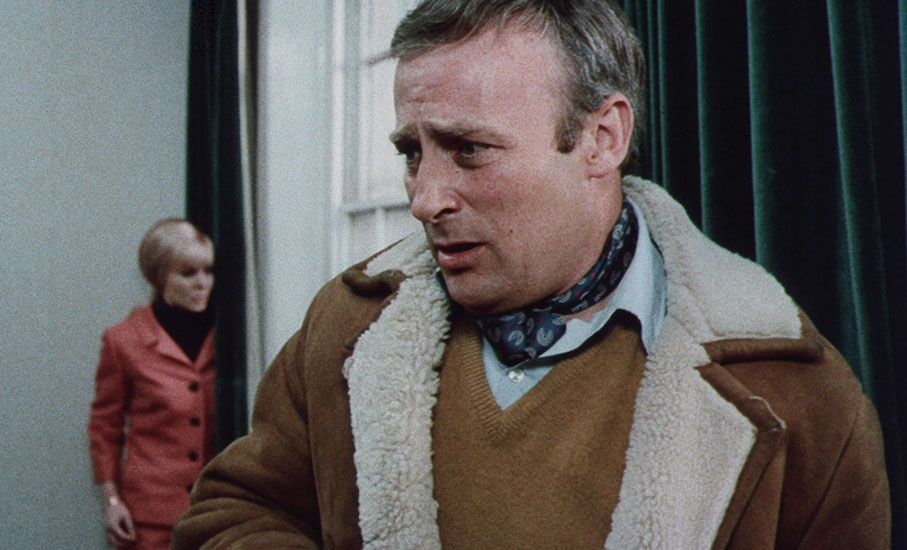
THE PEMINI ORGANISATION (Indicator Blu-ray)
I love it when labels like Indicator put out releases like this, rescuing films of quality that a range of circumstances beyond the filmmakers’ control have effectively buried, and making them available for wider appreciation. And it doesn’t end there. Not only do we get all three films made by close friends Peter Crane, Michael Sloan, and Nigel Hodgson under the Pemini Organisation banner, there are commentaries by Crane and Sam Dunn on all three films, plus an absolute slew of other superb special features spread over two Blu-ray discs. The result is another close-to definitive disc release, and the films themselves are a real revelation. If you’ve not checked this one out, click on the link below and find out why you really should.
Blu-ray review>>
THE PROPOSITION (BFI 4K UHD)
The BFI has so far been really selective in its decisions on which films to release on 4K UHD, and almost every time they manage to catch me out. I saw the logic in selecting a work as visually distinctive as Ingmar Bergman’s The Seventh Seal to put out first, but was really surprised by the announcement that the second BFI UHD release would be John Hillcoat’s brutal but riveting outback western The Proposition, which was written by Nick Cave, and starred Ray Winstone, Guy Pearce and Emily Watson. But it proved to be a savvy choice, with the film’s gorgeous burnt umber visuals really shining in 4K and supported by two commentaries – one by John Hillcoat and Nick Cave, the other by Australian critics Alexandra Heller-Nicholas and Josh Nelson – interviews, making-of featurettes, a poster, and an 80-page book with new writings and filmmaker recollections. A handsome release that we unfortunately did not receive the review disc for, hence the lack of more detailed coverage on the site.
PUTNEY SWOPE (Indicator Blu-ray)
Talking of films that might have passed me by were it not for the good people at Indicator, we have Robert Downey’s gloriously anarchic 1969 satire on the world of corporate advertising. It’s a film I fell head-over-heels in love with, one that made me laugh out loud, raise my eyebrows a couple of times, and kick myself for never having seen it before. With a transfer sourced from a 4K restoration by the Academy Film Archive and the Film Foundation, the film looks terrific here, and the special features, which include two commentaries and some engaging interviews, just added to my appreciation of Downey’s considerable achievement.
Blu-ray review >>
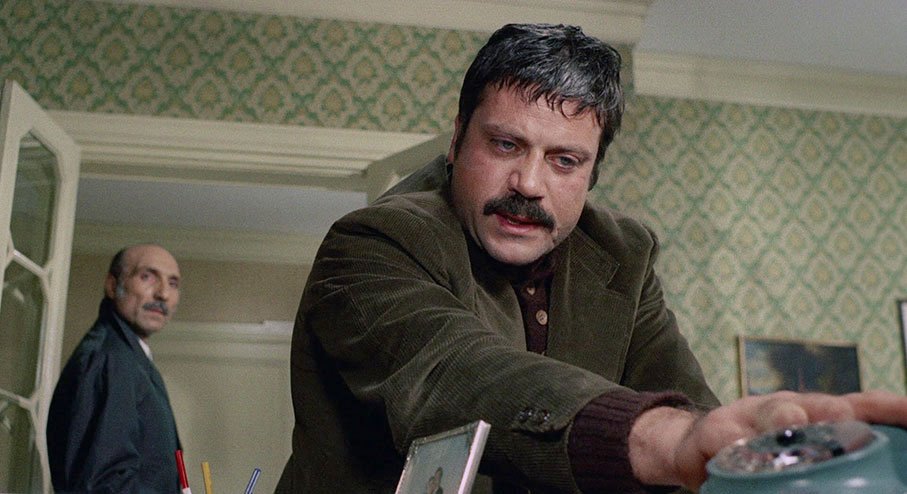
REVOLVER (Eureka Blu-ray)
As with Putney Swope, Sergio Sollima’s rivetingly handled 1973 crime drama Revolver, starring Oliver Reed and Fabio Testi, is on this list in part because I got so much out of the movie it itself, but also because of the care put into the release by Eureka. A fine transfer from a 4K restoration is backed by a hugely knowledgeable commentary by Barry Forshaw and Kim Newman, interviews with Nightmare USA author Stephen Thrower and actors Paola Pitagora and Fabio Testi, trailers and more. One of those films I had a review disc for but still bought the commercial release of because I wanted the finished product as part of my collection.
Blu-ray review>>
THREE MONSTER TALES OF SCI-FI TERROR (Eureka Blu-ray)
I could justify the inclusion of this three-film collection on the basis of just one of the included titles, having been a fan of John Sherwood’s criminally unsung 1957 alien invasion movie The Monolith Monsters for many years, to the point where I ordered and reviewed the now out-of-print German Blu-ray. But it’s joined here by two hugely enjoyable tales of the consequences of unchecked scientific experimentation in the shape of George Waggner’s 1941 Man Made Monster and Jack Arnold’s 1958 Monster on the Campus. All three films have been handsomely restored and are accompanied by commentaries from genre experts Stephen Jones and Kim Newman on two of the titles, and Kevin Lyons and Jonathan Rigby on the other. If I had a single gripe, it’s that I’d love to have seen the inclusion of an open matte print of The Monolith Monsters accompanying the one for Monster on the Campus, but this was also absent on German Blu-ray and has likely not had the restoration afforded to the SuperScope print. That aside, marvellous.
Blu-ray review>>
UNIVERSAL NOIR #1 (Indicator Blu-ray)
It’s hard to say whether Columbia Noir #5: Humphrey Bogart is to be the last of Indicator’s Columbia Noir releases, but for those getting noir box set withdrawal symptoms, November saw the arrival of the first in what promises to be more of the same but from a different studio in the shape of Universal Noir #1. The set follows the template set by its predecessors, containing six less well remembered noir or noir-tinted titles from the studio’s back-catalogue, all given handsome transfers and accompanied by a lorryload of special features, including a commentary for each movie, some fascinating wartime short films, an audio recording of a glorious onstage interview with Joan Fontaine, and more. There are some fascinating films in here, the best of which for me is Norman Foster’s 1948 Kiss the Blood of My Hands, starring Joan Fontaine and Burt Lancaster. Can’t wait to see what will be served up next.
Blu-ray review >>
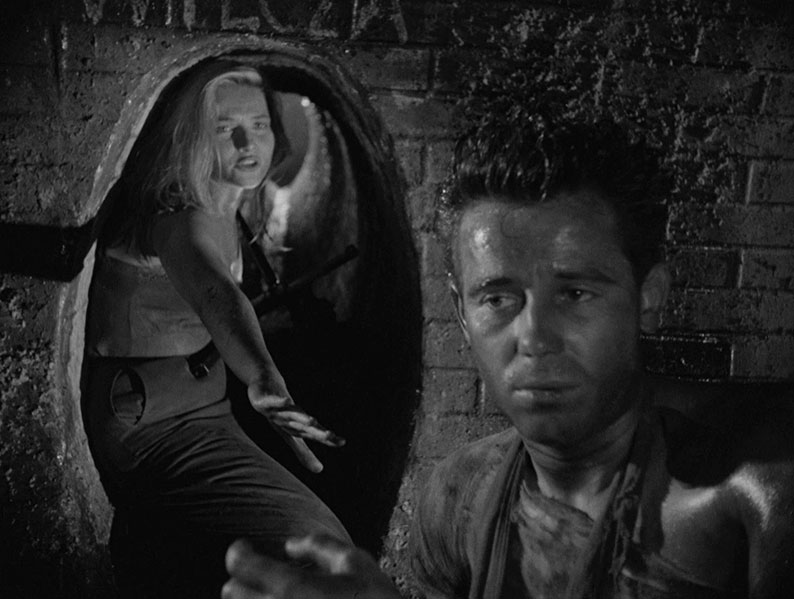
THE WAR TRILOGY: THREE FILMS BY ANDRZEJ WAJDA (Second Run Blu-ray)
A three-film collection from Second Run that fell victim to my decision to effectively shut the site down for a couple of weeks so that we could recharge our ageing batteries, but that still might get late site coverage this month, depending on what falls through my letterbox in the next few days. While I treasure Second Run for the lesser-seen titles that it showcases so well, the treatment given here to three rightly revered and thematically linked works by Polish maestro Andrzej Wajda – A Generation, Kanal and Ashes and Diamonds – would be have my highest recommendation on the basis of these extraordinary films alone. But the excellent HD transfers from new 2K restorations, coupled with fact-packed commentaries by Michael Brooke on all three films, introductions by Polish cinema expert Michał Oleszczyk, archival interviews with Wajda, booklets with new writings, and three of Wajda’s early short films, make this an essential purchase for anyone who truly loves cinema.
THE WITCH (Second Sight 4K UHD)
Robert Eggers probably deserves some sort of prize for landing a place on both of my lists this year, though his appearance on this one is as much down to Second Sight as it is to his bone-chilling debut feature. Eggers’ use of earthy colours and natural light really benefits from the 4K transfer here and particularly the greater dynamic range offered by the Dolby Vision HDR, and as ever with these lovely Second Sight special editions, it’s supported by some quality special features, including two commentaries, one by Eggers himself. It’s also handsomely packaged and includes a 150-page hardback book with some excellent new essays and 6 collector’s art cards. It’s one of several releases this year that remind me why I still love the tactile nature of physical media, and is a top-notch release of a terrific film.
So I’ll end it there. The site will continue to chug on, though as I noted above, I will be heading off for an extended break in lands afar in March, which I know from past experience will slow up my review output considerably for the month that I am away. That said, I will have my laptop with me, and will post any reviews sent to me by my fellow writers, as well as any news stories that m ay be of interest. In the meantime, I wish you all a better and healthy 2023 and hope we all get to see even more interesting movies than we watched in 2022.
|